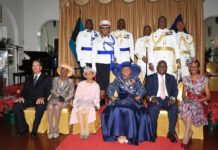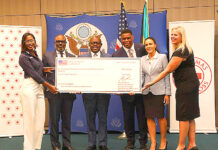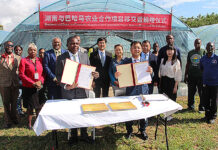Primary School students in New Providence eagerly greet Prime Minister, the Rt. Hon. Hubert Ingraham at the National Tourism Week Conference on Thursday, January 31, 2008. (Photo/Peter Ramsay)
Nassau, The Bahamas – The Bahamas will need to move beyond its traditional comfort zone to overcome its present shortcomings in the tourism industry, Prime Minister Hubert Ingraham said Wednesday.
Speaking to attendees of the National Tourism Week Conference in Nassau, the Prime Minister said this move will require that we adjust our strategies, expand our markets and evolve new programmes to make us more attractive to investors and to our visitors even as we strive to safeguard and protect the interests of Bahamians.
A Full TEXT Of THE PRIME MINISTER:
I am very pleased for the opportunity to address you at the beginning of National Tourism Week.
We often say that tourism is the engine of the Bahamian economy. Truthfully, it is our lifeline. We should treat it as such. Too often we do not.
Too often we behave as if the travelling public has no choice but to spend their warm weather vacations with us.
Of course, this is not so. Tourism and travel are the most rapidly expanding industry globally notwithstanding heightened security concerns and notwithstanding periodic economic downturns in the economies of major markets be they in the Americas, Europe or Asia.
Increasingly, over the past decade, other competitive warm vacation destinations have come to full maturity in the central and eastern Caribbean increasing the number of destinations seeking a piece of the regional tourism pie. While, in recent times, world wide tourism has increased by 7%, the Caribbean tourism pie only grew by 1%. And, of that increase Cuba and the Dominican Republic attracted some 60%.
Further, massive tourism infrastructures have been developed and/or expanded in the Spanish-speaking Caribbean: in the Dominican Republic, Cuba and along the Caribbean coast of Mexico and Central America.
New vacation destinations, further afield in the Middle East and Asia, have also not been without impact upon our tourism sector.
Ladies and Gentlemen:
Our task is not rocket science; in many instances, it is simple common sense. Our destination must be:
- clean
- friendly
- safe
- efficient
- cost effective
- interesting and
- diverse
We know that when our tourism wheel works well, we do very well economically.
When tourism falters, however, the consequences can be very serious as was the case at the beginning of the 1990s when hotel workers were generally reduced to two-day work-weeks, hotel room rates were at their all-time low as were tourism-derived government revenues.
Most of you will agree that our tourism product is not what it ought to be today, given our involvement in the industry for more than half a century.
I believe you would also agree that Bahamians have not invested in the sector to the extent that they might, whether in the ownership of small resorts, restaurants or other leisure-time and/or entertainment facilities, or in the provision of goods and services.
During the mid-1990s some fledgling Bahamian businesses improved and increased locally produced goods and services for the tourism sector. This raised hopes and expectations for the creation of meaningful linkages between tourism and agriculture, fisheries, food processing and light manufacturing. Indeed, we sought to foster and encourage such development by including specific provisions in Heads of Agreements beginning in 1992.
The reality remains, however, that the linkages are still tenuous. The potential for measurable increase in local value-added in the tourism sector has not been realized; tourism remains a predominantly foreign-owned business.
Of course, the slow-down in the tourism sector, beginning in 2006, and continuing through last year, 2007 did not have a single origin.
As the workforce of the tourism sector, you know that our efforts to remain competitive as a destination of choice are challenged by a number of issues including:
- We are a high-cost destination especially in terms of utilities and services. In particular, visitors find our communications expensive and unreliable;
- Infrastructural inadequacies including deficient air and sea ports and poor roads;
- The recent and increased success of the cruise industry in comparison to land-based destination vacations;
- New warm-weather destinations, within and outside of the region, providing the travelling public with increased choices of vacation destinations;
- The still inadequate local value added in-put to the tourism sector;
- And, insufficient attention to product development, upkeep and enhancement.
These developments require a response by both the Government and the private sector.
Over the years the Government has had a multi- pronged involvement in the industry, including the direct ownership of up to 20% of hotel rooms up to the early part of the last decade.
The Ministry of Tourism has been chiefly concerned with promotion and marketing – that is, attracting new and increased numbers of visitors to our country in concert with private sector operators of resorts including the promotion boards for New Providence and Paradise Island, Grand Bahama and for the Family Islands.
Also, through a series of incentive and concessionary legislation, the Government has sought to attract new hotel resort developers and operators to invest in the construction and operation of vacation resorts around the country.
This legislation, while targeting international investment, has not excluded local investment. Still, with few exceptions, it has not served to attract moneyed Bahamians into the sector.
And, through investment in the Bahamas School of Tourism and Hospitality, the Government has sought to increase the number of Bahamians qualified and capable of pursuing rewarding careers in the tourism sector.
This formula has produced mixed results. It is, I believe, no longer sufficient.
And so while it is important and indeed necessary for us to continue to work in all these areas we will need to move beyond our traditional comfort zone to overcome our present shortcomings.
This will require that we adjust our strategies, expand our markets and evolve new programmes to make us more attractive to investors and to our visitors even as we strive to safeguard and protect the interests of Bahamians.
You will be aware that the Ministry of Tourism, following upon an extensive search, retained new public relations and advertisement consultants for North America.
A similar exercise is planned for other markets as we seek to take advantage of new growth markets and to protect traditional source markets.
Our research data reveals that the preferences of the travelling public are shifting.
Increasingly, vacation accommodation is being driven and financed by ownership rather than by traditional financing that speculated on occupancy and yield levels, as was the case in earlier times.
As a result many traditional European Plan (EP) hotels have transformed themselves into mixed-use resorts.
And, vacation ownership products have expanded to include timeshare and vacation-ownership plans, condo-hotel residences and fractional ownership.
While responding to this new trend, we must also make certain that owners and operators of our traditional hotels and other tourists facilities ensure that their properties are outfitted and equipped with the amenities demanded and expected by visitors, and that our guests leave our properties believing that they have received good value for money.
It is also important for us to respond to the increased interest of visitors in a variety of cultural and heritage experiences, and souvenirs relevant to these experiences.
Of equal importance is the need to be conscious of, and sensitive to, the environmental stewardship that many of today’s tourists expect.
This is, of course, important not only to meet expectations of our visitors but to ensure the sustainability of the industry and the preservation of our natural and cultural heritage.
My Government is especially conscious that the sustainability of our tourism sector can be threatened if inappropriately-sized developments are permitted to exhaust natural resources, increase pollution and exceed the capacity of available human resources.
We are similarly conscious of the need to protect our people from the ugly side of tourism – the displacement of families and the adoption of new behaviours that counter local traditions and customs.
Hence, the importance of my Government’s commitment to make increased use of social and economic impact assessments when considering large development projects, so that we can achieve a desired balance between investors’ requirements and those of the communities in which these projects will reside.
Recently, I commented that the make-up of our country of many islands had gifted us with a dynamic culture, an intriguing historical heritage and a rich environmental endowment.
Certainly, with informed planning and forethought we are well-placed to respond to the changing demands and expectations of both today’s tourists and our own national interests to preserve things Bahamian for generations of Bahamians yet unborn.
Ladies and Gentlemen:
We must do a better job of keeping our tourism product, including public infrastructure, at acceptable standards.
On New Providence and Paradise Island and in Grand Bahama, we have long offered the traditional beach experience and the casino, nightlife and shopping amenities expected from international patrons of world class hotels.
In too many instances however, our standards have dropped. The City of Nassau is considered by too many observers to be congested, shabby and run-down. Many distinctive shops that less than a decade ago graced Bay Street have become shadows of themselves.
We propose to restore the city of Nassau in partnership with the private sector and through dedicated and targeted investments incentives, starting with the harbour, the waterfront, Woodes Rodgers wharf, and public buildings.
We will take care to maintain the essential characteristics of our Capital City and preserve its heart.
We will beautify the city, make it greener, and greatly improve its appearance and ambience.
We will complete the stalled and abandoned construction of the Nassau Street Magistrate’s Court House and the Registrar General’s offices on Market Street. And, we will construct a new Supreme Court.
As well, a number of government buildings have sat condemned in the City of Nassau for a number of years. We will restore or demolish the Adderley Building and the Rodney Bain Building.
Complementary to works to improve the Harbour we will continue the upgrade of Woodes Rodgers Wharf and extend it eastward to at least Victoria Avenue if not Armstrong Street. This will provide an alternative east to west throughway relieving traffic on Bay Street in the city-centre.
We will also complete the paving of roads and junctions in our city centre including the replacement of the asphalt road with cobble stones extending eastward from Rawson Square to the Hilton British Colonial Hotel setting the stage for the introduction of pedestrian only sections along Bay Street.
We will repair and upgrade the old customs warehouses on Prince George Dock transforming them into an authentic Bahamian Crafts Market.
We will demolish the old customs building on Arawak Cay.
This will enhance the entrance to our city-centre, remove much of the grime; help reduce congestion and remove the sense of decline.
We will also expand the Potter’s Cay dock.
Associated with improved town planning, will be a systematic programme to identify, label and clear all public beach access in New Providence.
In Grand Bahama and the Family Islands we have an opportunity to respond to the travellers’ need for diversity and our countries compelling mandate to utilize its most precious resource in a sustainable manner for the benefit of our citizens.
While not eschewing all large-scale development in the Family Islands we must guard against the urbanization of small, intimate settlements that are better suited to the development of high-end, environmentally-conscious and culturally attuned resorts that offer a relaxed, paced experience.
It is to be remembered that over the centuries the people of The Bahamas have endured a myriad of experiences, many the result of developments in the United States of America, for example, the years of slavery and emancipation, Prohibition and the American War of Independence.
As a result, we are home to many artifacts, ruins and monuments tied not only to our own experiences but to the history of our largest tourist market to the north.
Heritage and cultural tourism allow the visitor to experience the essence of who we are while ensuring that we play to our greatest resource-our people.
Our planned programme to restore heritage sites, sponsor cultural festivals and increase support for linkages with our main industry will ensure the further growth in diversity of our tourist product.
Identifying, restoring, and stabilizing heritage sites will ensure that they serve as permanent attractions for residents and visitors for years to come.
Ladies and Gentlemen:
The Government will do its part. A number of projects are to be undertaken to upgrade and enhance public infrastructure, particularly where it has been permitted to lag behind acceptable standards.
Accordingly, in New Providence the major redevelopment of the Lynden Pindling International Airport is proceeding.
This will include the construction of a new US Departure Terminal, the transformation of the present US terminal into a new International Arrivals Terminal, and the construction of a new Domestic Departure and Arrivals Terminal.
Central to the redevelopment of the facility is the upgrade of both the airside and the landside of the airport.
In the Family Islands, a new airport, taxiway, terminal and air traffic control facility will be provided at Marsh Harbour, Abaco. Improvements to airport infrastructure in Treasure Cay, Abaco, Stella Maris and Deadman’s Cay, Long Island, and New Bight, Cat Island, will also be carried out.
We are similarly determined to do a better job at exploiting the potential for linkages between our agricultural, fisheries and light manufacturing sectors and the tourism sector.
The leakage of tourism revenues expended on tourism-related imports of goods that can be produced here at home at comparable quality and cost must be reduced. Such an initiative presents many and varied opportunities for Bahamian entrepreneurship.
I take this opportunity to reiterate that I have directed all government-sponsored funding programmes, namely: the Bahamas Development Bank loans; BAIC facilities; the Venture Capital Fund; the government-guarantee loan schemes; and the investment incentive programmes administered under laws such as the Industries Encouragement Act, to focus the bulk of their support on programmes that principally seek to help Bahamian businesses take advantage of such linkages.
Along these lines, we will put in place incentive legislation to facilitate the grant of concessions to developers and operators of tourist-related businesses including restaurants, shops, and entertainment establishments which are not located within the confines of a traditional hotel.
This means that development concessions will become available to Bahamians owners and developers of retail outlets, restaurants and entertainment facilities catering to tourists both within and outside of traditional hotels.
Such concessions might prove useful, for example, in convincing down-town merchants to undertake periodic and regular maintenance and to upgrade their properties.
There are a host of other matters, as I have previously suggested, that impact visitor experience to which we will also give priority attention: safety and security, transportation and communication, and human resource development.
Ladies and Gentlemen:
All these developments have economic, social and environmental policy implications for us.
The Bahamas has long recognized that by working together the public and private sectors are able to create a synergy which can propel the industry.
This is reflected in the history of our various promotion boards, in the joint marketing arrangements agreed over the years between the Government and major hotel developers and in a number of jointly-funded product enhancement initiatives.
Many of us have roles to play in the delivery of improved product and services in all areas of the industry.
Each of us must be a responsible contributor to our success.
What we need to do now, is to arrest the slippage of recent years and to begin a national effort to take back our rightful place on the regional tourism landscape.
I invite you, indeed I urge you, to become an advocate and a partner in a national effort to produce a renewed and improved Bahamian tourism industry.








